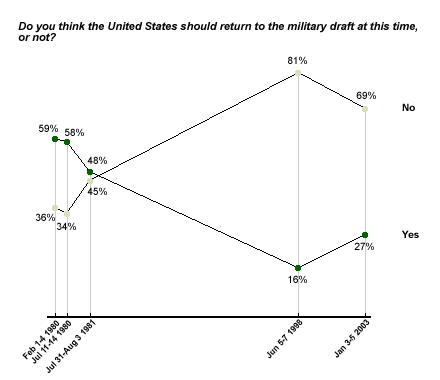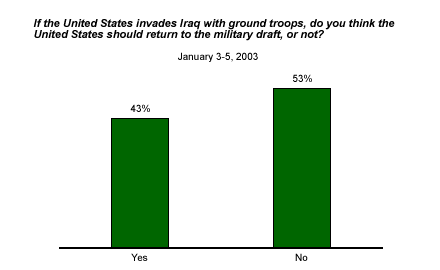With tensions between the United States and Iraq rising and North Korea's nuclear ambition now squarely in the public eye, the prospect of war looms large over the American public. While the United States maintains by all accounts the world's greatest military force, many Americans (particularly younger males) may wonder if a war would bring about the return of the military draft in this country. Gallup polling conducted earlier this month* shows that roughly a quarter of the population (27%) currently thinks the United States should return to the military draft, while the majority (69%) thinks it should not.
Understanding the Trend
The historical trend helps to place current responses to this question in context. Gallup first asked about the return of the military draft in February 1980, shortly after the December 1979 Soviet Union invasion of Afghanistan and after Jimmy Carter announced in his State of the Union speech that he would reinstitute Selective Service registration in case a future draft were necessary. At that time, public sentiment for the return of the draft was much higher -- 59% of Americans favored it. But by the following year, support for returning to the draft had dropped to 48%, according to a July-August 1981 Gallup Poll.
Gallup asked about the draft again in the summer of 1998 -- the last time the United States and its allies faced off with Iraq over U.N. weapons inspections. At that time, just 16% favored the return of the draft. Thus, if perceptions of the draft's necessity are any barometer, public concern about a possible war has surpassed that of 1998, but has not yet reached the level demonstrated during the Cold War in the 1980s. Support may have also been higher in the early 1980s since the draft had only recently been abandoned in 1973, whereas a return to the draft today would represent a more dramatic change in U.S. policy.

If the United States Invades Iraq?
The recent poll also asked about the possibility of bringing back the draft specifically if the United States invades Iraq with ground troops. Under those circumstances, the percentage saying the United States should return to the draft increases to 43%. Roughly half of the American public (53%) thinks the draft should not be instituted, even if the United States invades Iraq.

There is little difference of opinion between men and women on this issue. If the United States invades Iraq, 42% of men and 44% of women think the United States should return to the military draft. Although in the standard question with no reference to Iraq, there is a slight gender gap, with men more in favor than women of returning to the draft (31% to 24%, respectively).
Educational Differences
Education levels are also a key variable affecting people's opinions on the return of the draft. In response to both the general question about reinstituting the draft and the more specific question about doing so in the case of an invasion, those with more formal education are significantly less likely to be in favor. In general, 31% of those with a high school education or less say they favor the return of the draft, compared to 16% of those who have a college degree. More than half of those with a high school education or less (53%) say the United States should return to the draft if American troops invade Iraq, compared to roughly a third (34%) of those with a college degree.
*Results are based on telephone interviews with 1,000 national adults, aged 18 and older, conducted Jan. 3-5, 2003. For results based on the total sample of national adults, one can say with 95% confidence that the maximum margin of sampling error is ±3%.
For results based on the 487 national adults in the Form A half-sample and 513 national adults in the Form B half-sample, the maximum margins of sampling error are ±5%.
